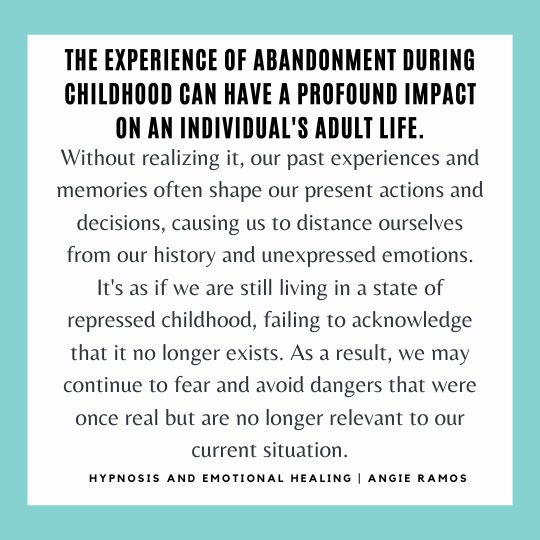Our upbringing has a significant impact on our adult lives, including how we feel about ourselves, how we relate to others, and our struggles with anxiety or depression. Emotional neglect is a crucial aspect of this impact that is often overlooked. It is surprising how much our childhood experiences can influence our emotional well-being.
What is Emotional Neglect?
Let’s begin by defining emotional neglect or abandonment. Emotional neglect refers to a situation where an individual’s emotional needs are consistently ignored, dismissed, invalidated, or unappreciated by a significant person. This is especially common during childhood when our parents, though physically present, may not be emotionally available.
Growing up in families where there is no emotional connection can lead to emotional disconnection among individuals. This means that they may find it difficult to understand the emotional needs of others and themselves too. As children, it is essential to receive affection, feel heard, seen, and protected to meet our emotional needs. This is not a luxury, but a necessity for our brains to develop. When parents struggle to comprehend their children’s needs for love, affection, closeness, and support, these needs go unmet, creating an insecure attachment bond.
It’s important to note that neglectful parents usually don’t do it intentionally. In most cases, they come from families where they were ignored or neglected as children by their own parents.
This creates a cycle where their own needs are not met as adults, leading to negative responses to their children’s needs such as resentment or jealousy. Sometimes, they are so focused on fulfilling their own needs that they fail to see their children’s needs. Understanding the impact of emotional neglect can help break these cycles and create healthier, more connected relationships. It’s never too late to address and heal from these patterns.
Emotional neglect casts a silent shadow, a weight carried in the spaces between words and the echoes of unspoken needs. Healing begins by acknowledging the whispers of your neglected emotions

What’s the impact?
Emotional neglect can have a significant impact on our lives and our perception of the world. It’s essential to understand that when a child experiences emotional abandonment, it can have severe consequences. These may include delayed development, hyperactivity, aggression, depression, low self-esteem, running away from home, substance abuse, and various emotional disorders. These outcomes have been proven through the study of Adverse Childhood Experiences (ACEs).
Growing up in an environment where expressing our emotions is not encouraged can lead us to hide parts of ourselves that we believe will be ignored by our parents. This can cause a disconnection with our true selves, our emotions, and can lead to the adoption of behaviors that help us cope with the pain we experience as children.
Children who do not feel loved or wanted may try to please others or behave badly in order to gain attention, which is what they crave and need. Growing up with this type of emotional neglect can lead to a tendency to isolate oneself from others or appear emotionally distant.
In addition, some people may unconsciously avoid close emotional relationships out of fear of vulnerability. The severity of the emotional neglect and personal vulnerability will determine the extent of its impact, and individuals may develop different coping mechanisms and behaviors as a result of this emotional wound.
Long-term consequences of neglect:
- Emotional neglect can have several negative effects on an individual, such as higher rates of anxiety, depression, and other psychiatric disorders in adulthood.
- It can lead to frequent negative emotions like anger, guilt, shame, and fear.
- People who have experienced emotional neglect are at an increased risk of developing substance use disorders and addictions.
- They may also suffer from low self-esteem, self-doubt, or lack of confidence, and have trust issues and difficulties forming close, healthy relationships.
- Emotional neglect can lead to internalization or suppression of emotions, making it difficult for individuals to open up to people.
- They may also have more problems regulating emotions, leading to uncontrolled outbursts.
- People who have experienced emotional neglect may have poor social skills and boundaries, and may find it difficult to ask for or accept help.
- They may also have a negative self-image, high levels of self-criticism, or negative self-talk, which can lead to social isolation or withdrawal.

10 Signs of Childhood Emotional Neglect
Growing up with emotional neglect can manifest in various signs, and the following are the ten most common symptoms indicating emotional abandonment:
1. Difficulty identifying and expressing emotions
Struggling to communicate feelings and emotions is a typical sign of childhood emotional neglect. If you felt that your emotions were not valid while growing up, you probably learned to ignore or suppress them. This can lead to an internal disconnection, making it not only challenging to express emotions but also difficult to identify precisely what you’re feeling.
Impact on relationships:
Difficulty opening up and being vulnerable may make relationships seem one-sided, superficial, and emotionally draining.
2. Difficulty with Self-Compassion:
Struggling with self-compassion while being compassionate toward others, often harboring self-criticism and judgment.
Impact on Relationships: Lack of self-compassion can result in focusing on others’ needs, struggling to establish boundaries.
3. Feeling numb or empty
Experiencing a sense of numbness or emptiness is a common symptom of emotional distress. This feeling can manifest in different ways, such as feeling a void in the body or being emotionally numb. It can also lead to a sense of drifting through life on autopilot.
This emotional state can have a significant impact on relationships. Difficulty experiencing emotions may make it challenging to form deep connections and lead to feelings of dissatisfaction.
4. Difficulty Trusting and Depending on Others
It’s common for people who experienced childhood emotional neglect to have difficulty trusting and depending on others. They may find it hard to accept help from others due to past experiences of emotional unavailability. This fear of depending on others can have a significant impact on their relationships. They may be reluctant to seek support or open up due to anxiety and a fear of disappointment.
5. Unrealistic Self-Perception
Individuals who experienced emotional neglect during childhood may develop unrealistic self-perception, leading to the development of a harsh inner critic and negative beliefs about themselves. This may cause feelings of insecurity and imposter syndrome.
Impact on Relationships: The resulting overwhelming feelings of inadequacy may have a significant impact on one’s self-esteem and how they navigate relationships.
6. Exaggerated Reaction to Conflict
Exaggerated reactions to minor conflicts may indicate a lack of self-regulation skills. This can lead to intense emotional outbursts or shutting down during disagreements. Such difficulties in navigating disagreements can strain relationships and cause disproportionate reactions.
7. Feelings of Guilt and Shame
Experiencing emotional neglect can lead to feelings of guilt and shame. Individuals who have gone through emotional neglect may blame themselves for negative events or situations, which can trigger self-blame, shame, or anger. These emotions can have a significant impact on relationships, as they may lead to difficulty in handling mistakes and experiencing shame, which can affect self-esteem and relationships.
8. Feeling Different
Emotional trauma can have a profound impact on both our mind and body, particularly when it occurs during childhood and our nervous system is still developing. Neglect or abandonment can lead to feelings of isolation and difference, which can be difficult to overcome. This can create a cycle of shame and further isolation, making it challenging to connect with others.
9. Self-Doubt and Unhealthy Relationships
It is possible that the emotional trauma leads you to stay in unhealthy relationships where the boundaries are blurred or not so clear. It is also possible that you remain in relationships where you are not respected; and in severe cases, you endure the abuse, because you don’t trust yourself, your worth, and your feelings of what is right or wrong.
Doubt, insecurity, and self-doubt can surround you, making it hard to find confidence, stability, and emotional resilience.
10. Difficulty Being Assertive
Having the ability to communicate one’s needs clearly and effectively is the benefit of assertiveness. It helps to avoid conflicts without yelling or fighting, but with a confidence that allows us to set clear and firm boundaries. On the other hand, a lack of assertiveness can have a negative impact on our personal relationships, career growth, and communication with the world.
This is closely related to our self-confidence and the ability to recognize our emotions and needs. If we fail to identify them, we can hardly articulate them, let alone communicate them clearly. Therefore, to develop assertiveness, we need to enhance our emotional intelligence and establish boundaries.
Healing emotional abandonment is possible
Recognizing the ways in which emotional neglect has affected us can be an essential part of the healing process. All survivors deserve to live without the hidden wounds of emotional neglect and we all deserve to live in peace and tranquility.
If any of the symptoms listed resonate with you, it may be worth working through this process, to unpack the trauma, recover, and evolve safely. With self-compassion, you can give yourself the empathy and support that you did not receive as a child and overcoming childhood emotional neglect you can heal and see life differently.
If you are interested in working with me with a comprehensive approach (mind, nervous system and body), I invite you to schedule your appointment with me and let’s begin this beautiful process of returning to yourself.






0 Comments